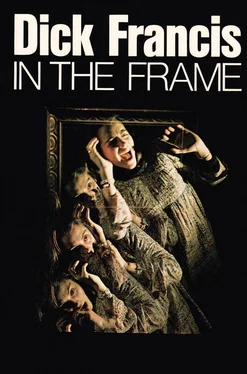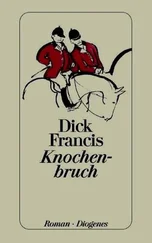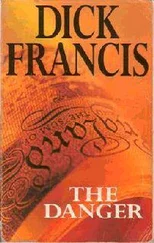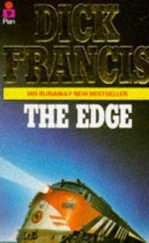‘Gloves,’ he said, handling me some, and putting some on himself. They were of white cotton, with ribbed wristbands, and looked a lot too new and clean. I wiped the backs of mine along the wings of Jik’s car, and he gave me a glance and did the same with his.
‘Handles and impact adhesive.’
He gave me the two handles to hold. They were simple chromium plated handles, with flattened pieces at each end, pierced by screw holes for fixing. Sturdy handles, big enough for gripping with the whole hand. I held one steady, bottom side up, while Jik covered the screw-plate areas at each end with adhesive. We couldn’t screw these handles where we wanted them. They had to be stuck.
‘Now the other. Can you hold it in your left hand?’
I nodded. Jik attended to it. One or two people passed, paying no attention. We were not supposed to park there, but no one told us to move.
We walked across the pavement to the gallery. Its frontage was not one unbroken line across its whole width, but was recessed at the right-hand end to form a doorway. Between the front-facing display window and the front-facing glass door, there was a joining window at right angles to the street.
To this sheet of glass we stuck the handles, or rather, Jik did, at just above waist height. He tested them after a minute, and he couldn’t pull them off. We returned to the car.
One or two more people passed, turning their heads to listen to the radio on the car roof, smiling in brotherhood at the universal national interest. The street was noticeably emptying as the crucial time drew near.
‘... Vinery carries the colours of Mr. Hudson Taylor of Adelaide and must be in with a good outside chance. Fourth in the Caulfield Cup and before that, second at Randwick against Brain-Teaser, who went on to beat Afternoon Tea ...’
‘Stop listening to the damn race!’ Jik said sharply.
‘Sorry.’
‘Ready?’
‘Yes.’
We walked back to the entrance to the gallery, Jik carrying the sort of glass-cutter used by, among others, picture framers. Without casting a glance around for possible onlookers, he applied the diamond cutting edge to the matter in hand, using considerable strength as he pushed the professional tool round the outside of the pane. I stood behind him to block any passing curious glances.
‘Hold the right-hand handle.’ he said, as he started on the last of the four sides, the left-hand vertical.
I stepped past him and slotted my hand through the grip. None of the few people left in the street paid the slightest attention.
‘When it goes,’ Jik said, ‘for God’s sake don’t drop it.’
‘No.’
‘Put your knee against the glass. Gently, for God’s sake.’
I did what he said. He finished the fourth long cut.
‘Press smoothly.’
I did that. Jik’s knee, too, was firmly against the glass. With his left hand he gripped the chromium handle, and with the palm of his right he began jolting the top perimeter of the heavy pane.
Jik had cut a lot of glass in his time, even if not in exactly these circumstances. The big flat sheet cracked away evenly all round under our pressure and parted with hardly a splinter. The weight fell suddenly on to the handle I held in my right hand, and Jik steadied the now free sheet of glass with hands and knees and blasphemy.
‘Jesus, don’t let go.’
‘No.’
The heavy vibrations set up in the glass by the breaking process subsided, and Jik took over the right-hand handle from me. Without any seeming inconvenience he pivoted the sheet of glass so that it opened like a door. He stepped through the hole, lifted the glass up wholesale by the two handles, carried it several feet, and propped it against the wall to the right of the more conventional way in.
He came out, and we went over to the car. From there, barely ten feet away, one could not see that the gallery was not still securely shut. There were by now in any case very few to look.
‘... Most jockeys have now mounted and the horses will soon be going out onto the course ...’
I picked up the radio. Jik exchanged the glass-cutter for a metal saw, a hammer and a chisel, and shut the boot, and we walked through the unorthodox entrance as if it was all in the day’s work. Often only the furtive manner gave away the crook. If you behaved as if you had every right to, it took longer for anyone to suspect.
It would really have been best had we next been able to open the real door, but a quick inspection proved it impossible. There were two useful locks, and no keys.
‘The stairs are at the back,’ I said.
‘Lead on.
We walked the length of the plushy green carpet and down the beckoning stairs. There was a bank of electric switches at the top: we pressed those lighting the basement and left the upstairs lot off.
Heart-thumping time, I thought. It would take only a policeman to walk along and start fussing about a car parked in the wrong place to set Cassavetes and Todd on the road to jail.
‘... horses are now going out on to the course. Foursquare in front, sweating up and fighting jockey Ted Nester for control ...’
We reached the front of the stairs. I turned back towards the office, but Jik took off fast down the corridor.
‘Come back,’ I said urgently. ‘If that steel gate shuts down...’
‘Relax,’ Jik said. ‘You told me.’ He stopped before reaching the threshold of the furthest room. Stood still, and looked. Came back rapidly.
‘O.K. The Munnings are all there. Three of them. Also something else which will stun you. Go and look while I get this door open.’
‘... cantering down to the start, and the excitement is mounting here now ...’
With a feeling of urgency I trekked down the passage, stopped safely short of any electric gadgets which might trigger the gate and set off alarms, and looked into the Munnings room. The three paintings still hung there, as they had before. But along the row from them was something which, as Jik had said, stunned me. Chestnut horse with head raised, listening. Stately home in the background. The Raoul Millais picture we’d seen in Alice.
I went back to Jik who with hammer and chisel had bypassed the lock on the office door.
‘Which is it?’ he said. ‘Original or copy?’
‘Can’t tell from that distance. Looks like real.’
He nodded. We went into the office and started work.
‘... Derriby and Special Bet coming down to the start now, and all the runners circling while the girths are checked ...’
I put the radio on Wexford’s desk, where it sat like an hourglass, ticking away the minutes as the sands ran out.
Jik turned his practical attention to the desk drawers, but they were all unlocked. One of the waist-high line of filing cabinets, however, proved to be secure. Jik’s strength and knowhow soon ensured that it didn’t remain that way.
In his wake I looked through the drawers. Nothing much in them except catalogues and stationery.
In the broken-open filing cabinet, a gold mine.
Not that I realised it at first. The contents looked merely like ordinary files with ordinary headings.
‘... moved very freely coming down to the start and is prime fit to run for that hundred and ten thousand dollar prize ...’
There were a good many framed pictures in the office, some on the walls but even more standing in a row on the floor. Jik began looking through them at high speed, almost like flicking through a rack of record albums.
‘... handlers are beginning to load the runners into the starting stalls, and I see Vinery playing up ...’
Half of the files in the upper of the two drawers seemed to deal in varying ways with insurance. Letters, policies, revaluations and security. I didn’t really know what I was looking for, which made it all a bit difficult.
Читать дальше












